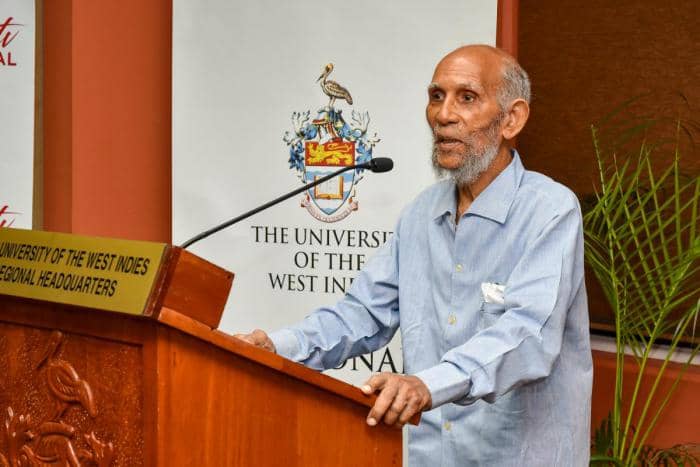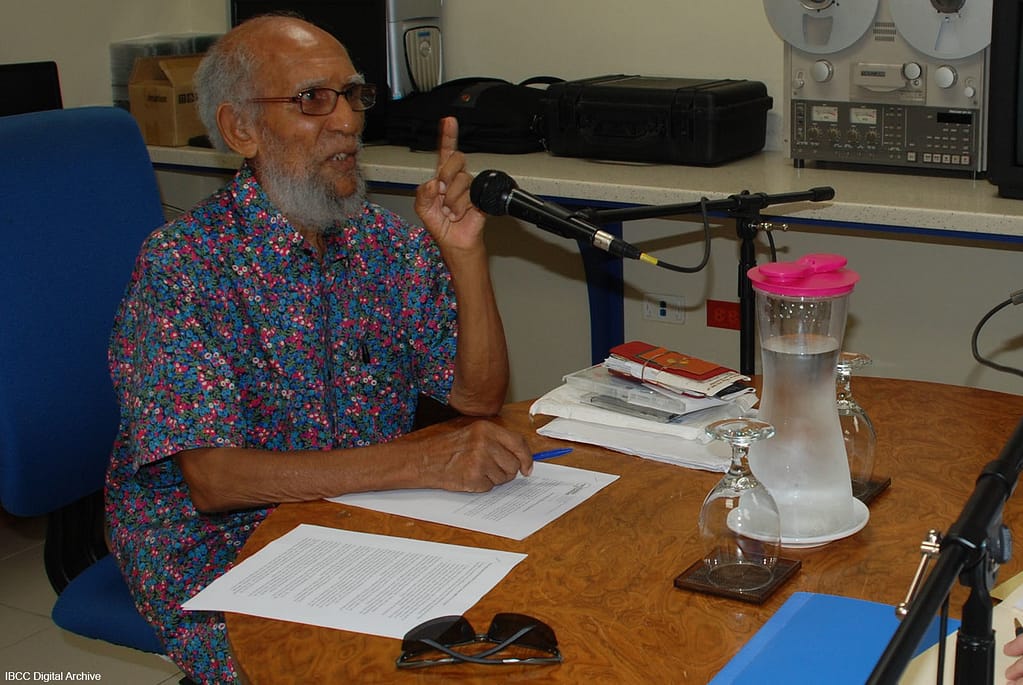
Sir Fitzroy “Roy” Augier – 100 not out!
On behalf of The University of the West Indies (The UWI) community, Vice-Chancellor Professor Sir Hilary Beckles offers the following tribute to Caribbean Renaissance Man and Professor Emeritus of History, Sir Fitzroy ‘Roy’ Augier, on his 100th birth anniversary.
“On December 17, 2024, Sir Fitzroy “Roy” Augier celebrated his 100th birthday. What a magnificent ongoing innings – 100 not out! Scholar, educator, activist, World War II veteran, and administrator, Roy is a true Caribbean Renaissance Man. He continues to inspire us to reflect on our Caribbean history, how we perceive ourselves – not as how others perceive us, and how that sense of ownership and belonging should help us to fulfil a vision of a strong Caribbean civilisation in the future.
Born in Castries, Saint Lucia, he attended elementary and secondary schools before heading off to serve in the Royal Air Force as a gunner. After the war ended, he completed an MA and PhD in History at St Andrews University in Scotland, then made Jamaica his home for the next seventy years of his stellar century. Jamaica and The University of the West Indies were the bases from which he made significant contributions to shaping the direction of teaching and learning across the Caribbean at several levels across the decades.
Following his appointment at the then University College of the West Indies (UCWI) as a Research Fellow at ISER in 1954, he joined the Department of History in 1955, and became Professor of History in 1989, the pinnacle of academic achievement in the academy. As The UCWI transformed into The UWI, Roy’s strong sense of regionalism and activism also translated into ensuring that Caribbean History became a discrete subject and how it was taught and researched at the secondary and tertiary levels within the Caribbean. Roy and colleagues such as Douglas Hall, Shirley Gordon, Mary Reckord, Rex Nettleford and M.G. Smith produced seminal publications such as The Making of the West Indies; Report on the Rastafarian Movement; Sources of West Indian History and the UNESCO-sponsored project General History of the Caribbean, forever changing how scholars and people across the globe view the history of the Caribbean.
During – and after – his years at The UWI, Roy taught, advised or mentored several generations of Caribbean historians and academics. Verene Shepherd, Brian Moore, Swithin Wilmot and Kathleen Monteith are some of the academics who benefitted from engaging with Roy and other greats such as Elsa Gouveia and Douglas Hall. It was also my honour to benefit from his counsel during my own early years in the Department of History at the Mona Campus. I believe that our research and career trajectories were inspired by the intellectual activism that existed in the Department of History.
Roy was also integral to the development of the Caribbean Examinations Council from its inception, serving as lead for the Caribbean History Subject Panel in the early years and as Chairman of the Council from 1986 to 1996. He led the way in gaining acceptance by regional stakeholders for the CAPE examinations as a replacement for the British A-levels. CXC qualifications are now accepted for matriculation by leading universities around the world, which must be a tremendous source of pride for Sir Roy, who was affectionately dubbed “Mr. CXC” by many in recognition of his avid championing of the institution.
Husband, father, grandfather, Pro-Vice-Chancellor, Professor Emeritus, Caribbean Renaissance Man, at 100 not out, Roy, Sir Roy, we salute you on this historic birth anniversary and wish you the very, very best!”


The UWI has been and continues to be a pivotal force in every aspect of Caribbean development; residing at the centre of all efforts to improve the well-being of people across the region for the past 75 years.
From a university college of London in Jamaica with 33 medical students in 1948, The UWI is today an internationally respected, global university with near 50,000 students and five campuses: Mona in Jamaica, St. Augustine in Trinidad and Tobago, Cave Hill in Barbados, Five Islands inAntigua and Barbuda and itsGlobal Campus, and global centres in partnership with universities in North America, Latin America, Asia, Africa and Europe.
The UWI offers over 800 certificate, diploma, undergraduate and postgraduate degree options in Culture, Creative and Performing Arts, Food and Agriculture, Engineering, Humanities and Education, Law, Medical Sciences, Science and Technology, Social Sciences, and Sport. As the Caribbean’s leading university, it possesses the largest pool of Caribbean intellect and expertise committed to confronting the critical issues of our region and wider world.
The UWI has been consistently ranked among the top universities globally by the most reputable ranking agency, Times Higher Education (THE). The UWI is the only Caribbean-based university to make the prestigious lists since its debut in the rankings in 2018. In addition to its leading position in the Caribbean in the World University Rankings, it is also in the top 25 for Latin America and the Caribbean and the top 100 global Golden Age universities (between 50 and 80 years old). The UWI is also featured among the leading universities on THE’s Impact Rankings for its response to the world’s biggest concerns, outlined in the 17 United Nations Sustainable Development Goals (SDGs), including Good Health and Wellbeing; Gender Equality and Climate Action. In 2024, The UWI launched a first-of-its-kind global online graduate business school focused on leadership within the context of supporting the SDGs.
Advertise with the mоѕt vіѕіtеd nеwѕ ѕіtе іn Antigua!
We offer fully customizable and flexible digital marketing packages.
Contact us at [email protected]
















He born 1924? Are those recent pics….Looks better than alot of person in their 70s….Happy Century completion Sir
Comments are closed.